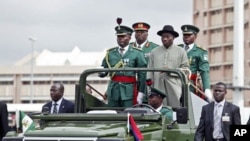Nigerian President Goodluck Jonathan is introducing a series of new anti-terrorism measures following a New Year's Eve bombing that killed four people in the capital.
In the next week, President Jonathan will appoint a special advisor on terrorism and a presidential committee on the control of explosive materials. Spokesman Ima Niboro said there also will be an inspection of police-licensed armories to establish the source of their arms and ammunition, as well as the installation of closed-circuit televisions, or CCTV's, to better monitor public places.
"Government is to introduce CCTV's in public places for access control," said Niboro. "Regulations are also underway for access control in private establishments."
The New Year's Eve bombing near a military barracks in the capital follows last week's explosions at a political rally in southern Nigeria and Christmas Eve violence in the northern city of Jos that killed 80 people and wounded more than 100. This recent series of bombings began with an Independence Day blast in October that killed 12 people.
Jonathan said the attacks are a new and dangerous challenge to peace and stability as Nigeria prepares for nationwide elections in April.
Spokesman Niboro said part of the new anti-terrorism measures will be stepped-up security around political events to deter electoral violence.
"In the build-up to the elections, the police have been directed to ensure the prompt arrest and prosecution of political thugs, because this is the time to do that," Niboro said.
Jonathan's response to this insecurity is an issue in his campaign for next week's ruling-party nomination for president. When he prematurely absolved southern militants of responsibility for the Independence Day bombing, northern politicians said he was acting irresponsibly.
Jonathan's decision to contest this election challenges an informal regional power-sharing agreement in the ruling party that says the next nominee should be from northern Nigeria. Next week's contest pits Jonathan, who is from the south, against the northern candidate, former vice president Atiku Abubakar.
New Security Measures Follow Nigerian Bombing












